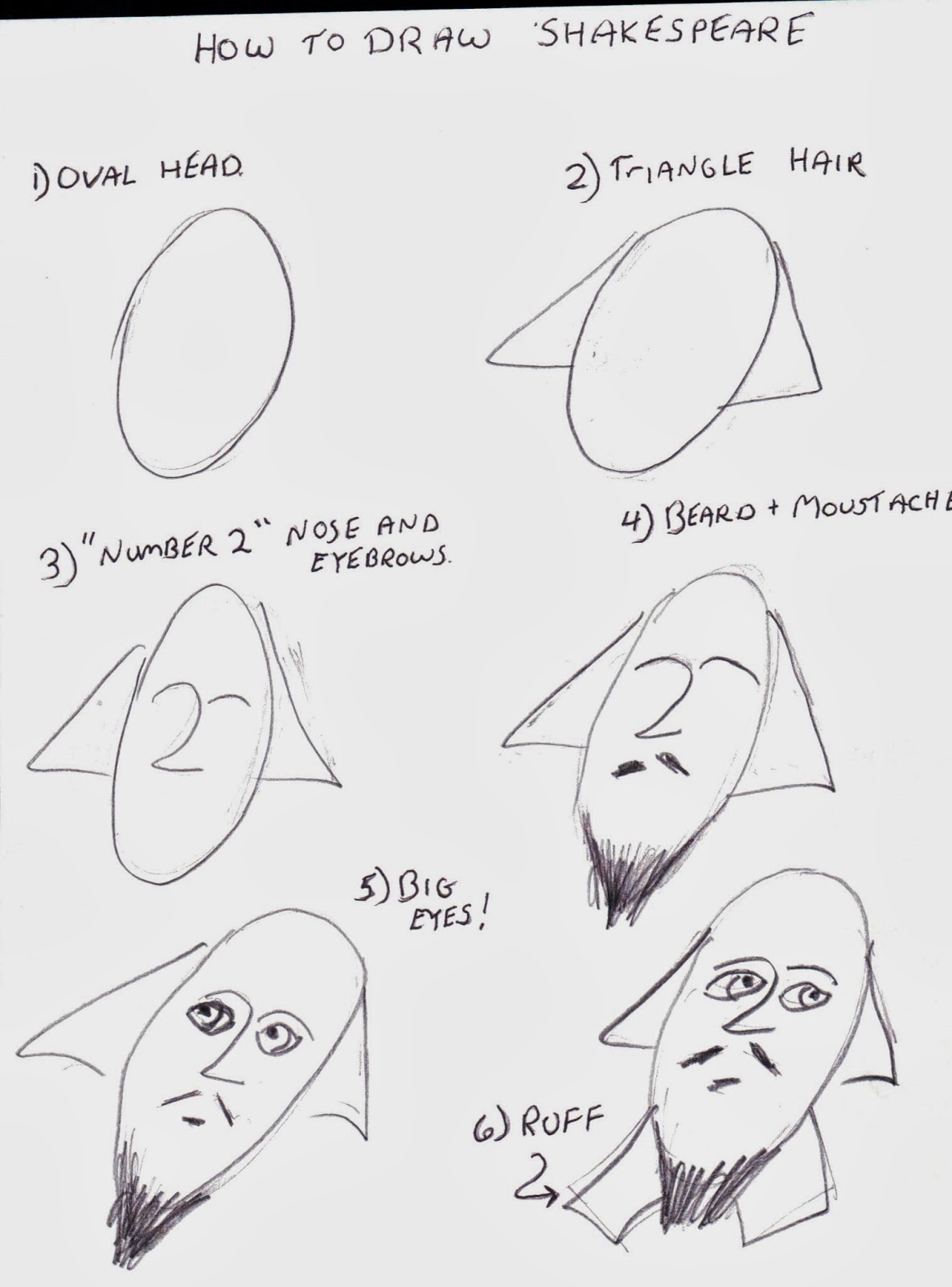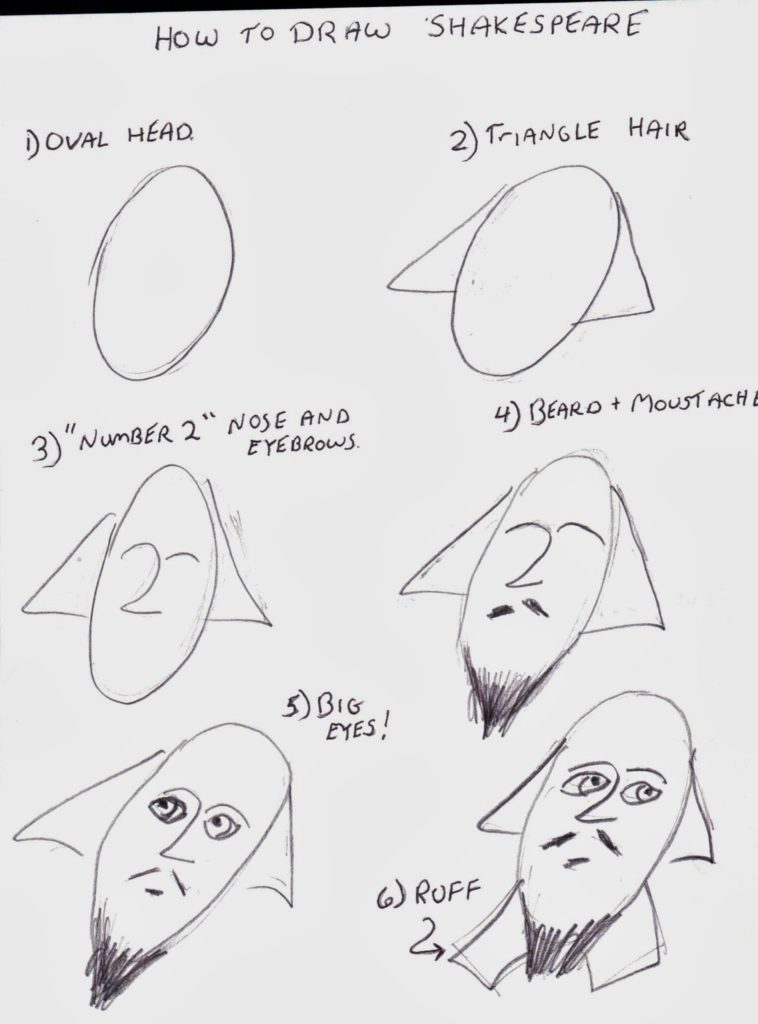This week I continued the tradition of volunteering in my childrens’ classrooms to teach whatever Shakespeare unit was welcome. In the past I’ve done sonnets, we’ve acted Midsummer, I pretty much make up a new lesson every time.
This year, for the 9yr olds (fourth grade), they were in the middle of their own ‘book talk’ week where each student read a biography and then did a presentation. So I was asked to do a Shakespeare book talk. Happily!
Brought all my props – my pop-up Globe Theatre
, my First Folio
, a whole bunch of books geared toward kids. Brought my new Shakespeare finger puppet
, my t-shirt with a big Shakespeare picture on it. Printed out a “Shakespeare mask” that I could wear, generated a puzzle for them to do (I always bring a puzzle), and created my own “How To Draw Shakespeare” worksheet as a handout.
In keeping with the book talk theme, I planned to talk about Bill Bryson’s The World As Stage
. I made up notecards in a timeline style, starting with 1564 and going through to 1623. Not that I particularly need them, but they made a nice prop and kept some structure on the thing.
Then realized that I’d forgotten my note cards. Which gave me a great opening, because I actually said to the kids, “I wrote all my notes down on a stack of cards just like I was supposed to, and I totally left them at home. Anybody else ever forget their homework?” Bunch of hands go up. Nice.
So I proceed to wing it for about 15-20 minutes. At every opportunity I hype the unknowns about Shakespeare’s life, because I think that will be the most interesting to them. How we don’t know the day he was born. How we could debate what he looked like. His “lost years”. I told these elementary school children that Shakespeare would have only gone to elementary school – but that he spent about 12 hours a day in school, 6 days a week. THAT got their attention.
I asked them what might have happened in 1593 to close the theatres. “War?” one asked. “Taxes?” asked another. There was a third that I can’t remember, I think he said something about unemployment. So we talked for a little while about the plague, and Shakespeare switching over to poetry for a little while to keep paying the bills.
I told them the story about losing the lease on The Theatre, and having to move the whole building across the river. When I tell that story I always make it sound like they did it in a single night, so the next morning the evil landlord came to see his property and Shakespeare and his gang were waving at them from across the river. Which led to my big reveal where I show them my pop up Globe theatre. Always a hit.
We eventually got to Shakespeare’s death, and to the publishing of the Folio. This gave me the opportunity to talk about being in the room with Folio #1, one of the most valuable books in the world. I also remembered from past experience to open up the Folio and walk around the room with it so they could see the actual text. “Do you guys have spelling tests?” I asked. All hands go up. “Guess what?” I say. “Shakespeare didn’t. They didn’t have spelling rules back then. Shakespeare could spell words however he wanted.” The children find this awesome. What’s really interesting to me is that I’ve opened to a page that says “Scena Secunda” and this is what they all point out. I tell them that it’s Latin, reminding them that Shakespeare would have learned Latin in school, and that it means “Scene 2.”
Eventually we switched over to questions, and that’s where it got amazing. Honestly, I thought I’d bored them. Turns out they were hanging on every word.
When did Shakespeare die, in the day or the night? How did he die? Couldn’t we dig up his bones and do that recreation thing to see what he looked like, like they did with King Tut? (Bardfilm points out to me that I totally should have brought up the curse on his bones, and I’m kicking myself that I forgot!) But I did tell them all about the recent Richard III discovery.
The teacher asked me my favorite play, I said The Tempest, which caused me to give a brief description of Tragedy / Comedy / Romance. Apparently the tragic concept was new to the kids. “Wait, the *good guy dies*???” “What about the bad guy, does he die too???” “Ok, so, wait, was Romeo and Juliet one of those tragedy plays?” “Juliet *dies* in the original?!” I even said at that point, “Spoiler alert! But, yes, that’s kind of the point about the tragedy plays, is that before you start reading you know the good guys are going to end up dead.”
I was asked how they’d do beheadings on stage back then. We talked about special effects, and animal blood, and Julius Caesar. I felt bad, sometimes my sense of humor gets the better of me, one of the kids asked what was the name of the play about Julius Caesar. I told him, “That’s a tricky one to remember, the one where Julius Caesar gets stabbed is called Julius Caesar.” After seeing the expression on his face I realized that he came away thinking I’d just called his question stupid. Not my intent!
But my absolute favorite question? The one that reminded me why this is all worth it?
“Can you still see Shakespeare’s plays today?”
…..and there it is. It’s so easy when surrounded by educated adults to fall into assuming what everybody else assumes and nobody ever speaks up and says. We know that we can do see Shakespeare. Most of the adults that know that also know that they’d never do such a thing, but that’s a different story. Shakespeare’s just kind of there for everybody at this point in our lives.
I just walked into a room full of 9yr old children who had no preconceived notions about our beloved playwright. Heck, many of them may not have ever heard of him. And by the time I was done there was at least one little girl who wanted to know if she still could experience the works of this guy that lived 400 years ago. I informed her that oh so very much she could, and how every year we go see Shakespeare under the stars in Boston Common, and how there are 4 Shakespeare movies coming out this year alone, and how a few months ago the local high school performed Hamlet.
Eventually the teacher had to kick me out because it was their library time. While I packed up and they lined up, one student asked me, “Was Sherlock Holmes a Shakespeare story?” I said that no, he came a few hundred years later. “Oh,” said the student, “Because he’s the good guy but he dies in the end after he gets the bad guy, so I thought it was one of those tragedies. But then he comes back.” I’m not really sure which Sherlock Holmes story he’s referring to, but the connection was fascinating.
Now you want to hear the other other best part? I heard from multiple sources (my daughter, and then the librarian herself) that all my new students went to their library time and said, “Do you have any books on Shakespeare?”
I wrote to the teacher and told her that I’m up for an encore if she is. She runs the school play (not Shakespeare) in April and asked if I could come back and help with that, perhaps use Shakespeare to get the over the stage fright of wanting to do the play at all. Ironic, really, when you consider that I’m here today doing this precisely because I was too shy in school to ever try acting myself. I can’t wait!


